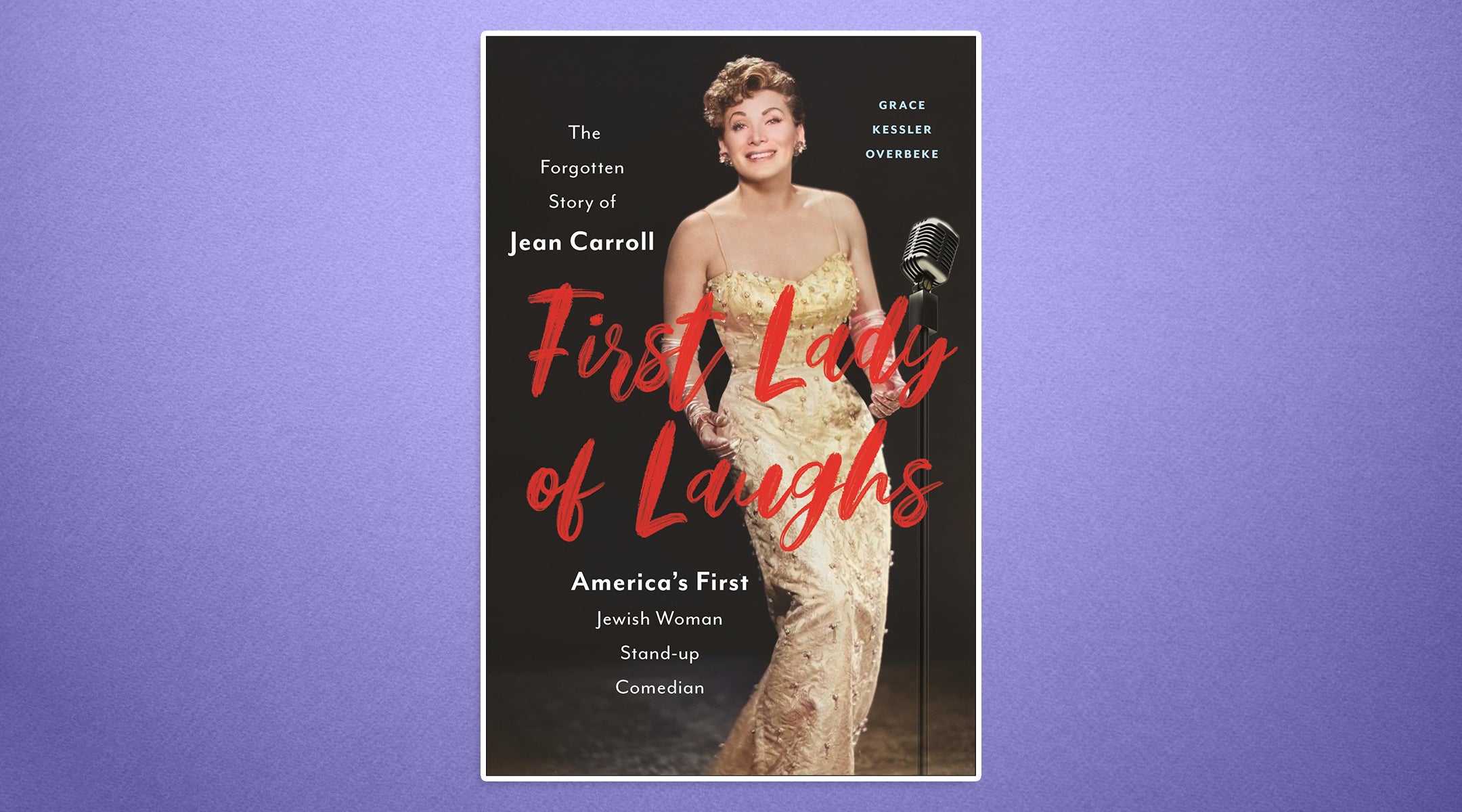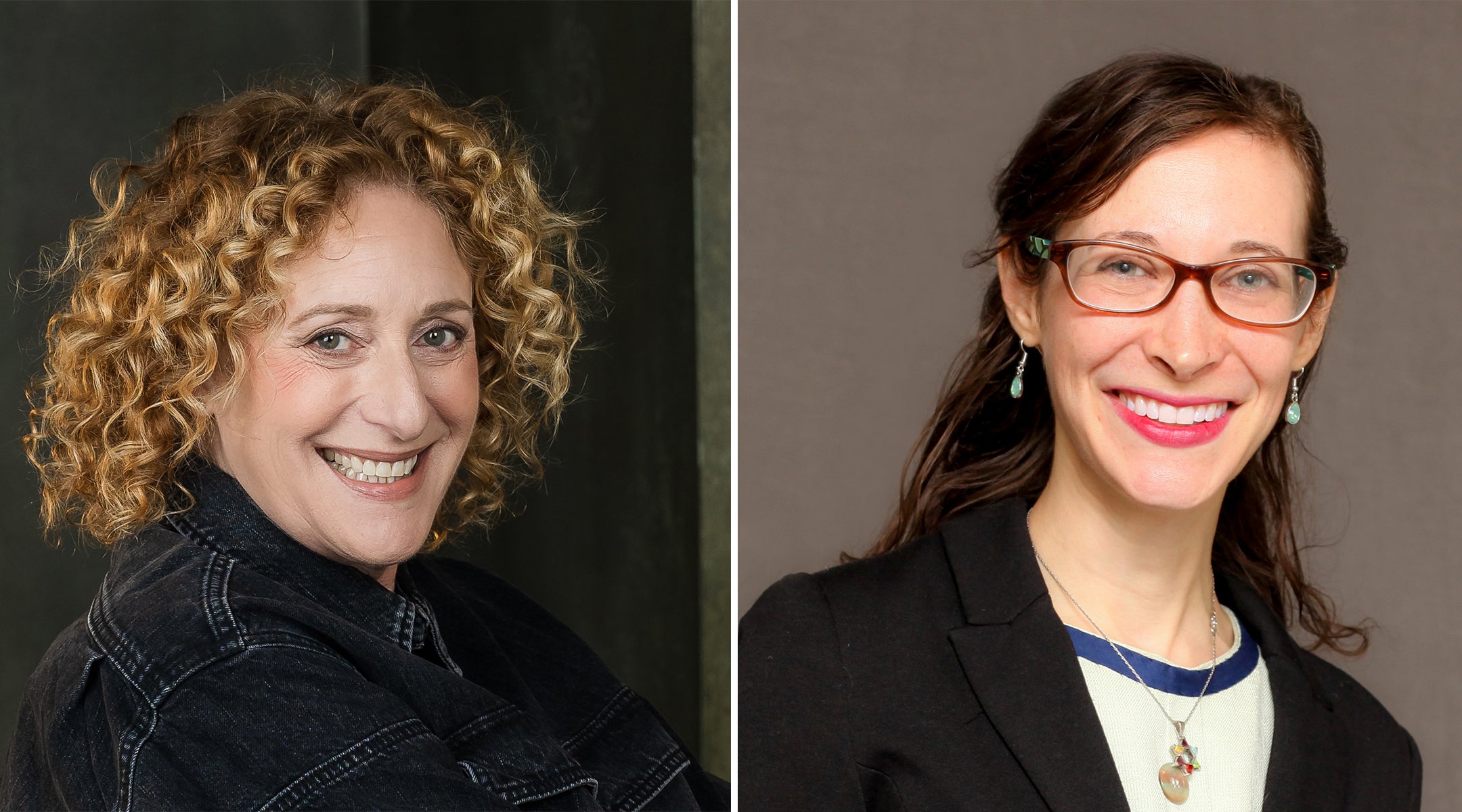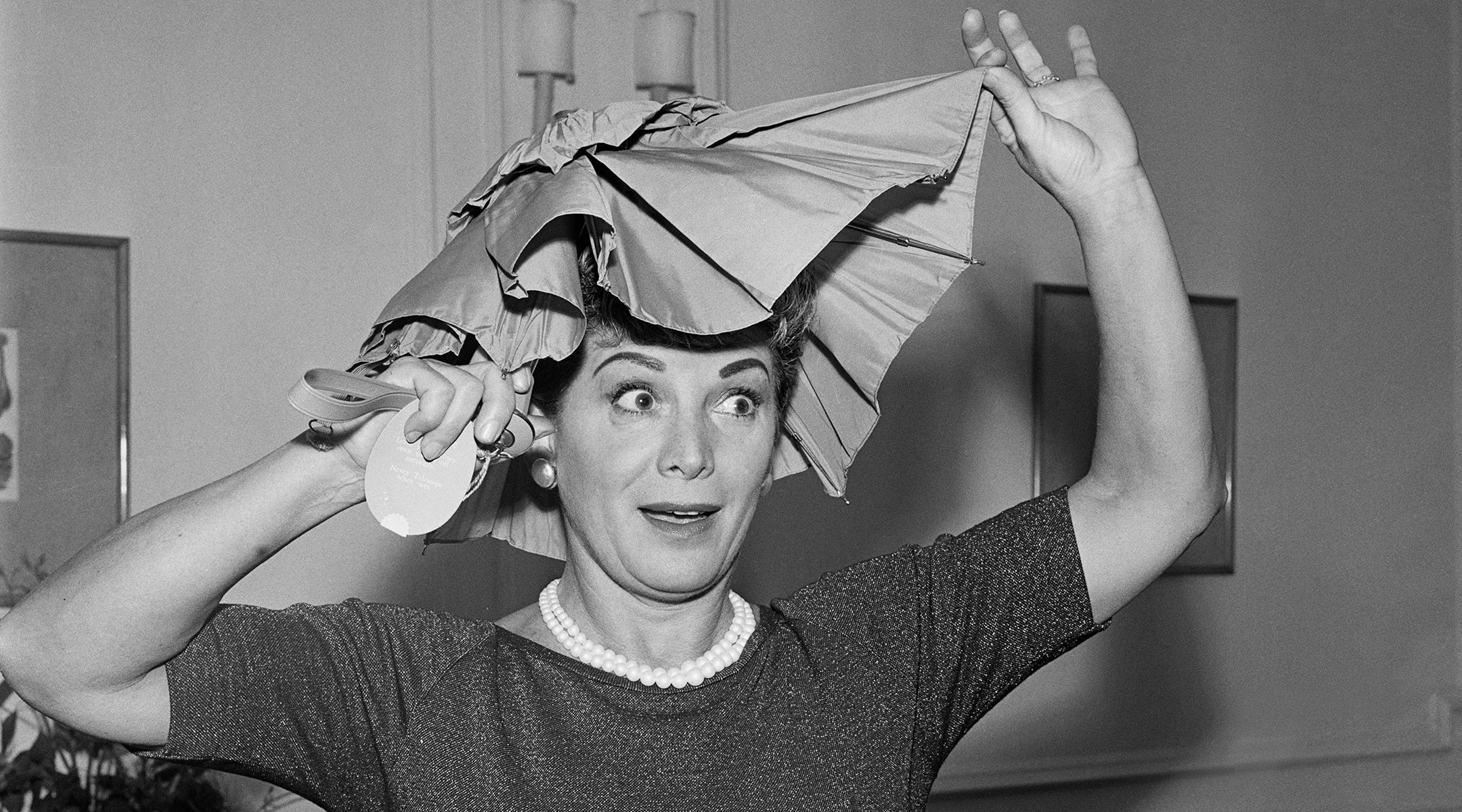Before there was Joan Rivers and Susie Essman, and long before showrunner Amy Sherman-Palladino dreamed up “The Marvelous Mrs. Maisel,” one Jewish comedian helped blaze a trail for the generations of hilarious women who followed her.
Her name is Jean Carroll, and she’s considered the first Jewish woman stand-up comedian. And if you’ve never heard of her, an event Thursday at the American Jewish Historical Society aims to rectify that.
Born in Paris in 1911 as Celine Zeigman, Carroll immigrated to the United States with her family when she was 8. She grew up in the Bronx, speaking Yiddish at home. By age 12, she’d pushed her abusive father out of the house and had begun supporting her mother and two older sisters financially by touring her comedy act during the last days of vaudeville.
Carroll achieved a great deal of success with her comedy career in the 1950s and ’60s. She performed on “The Ed Sullivan Show” 29 times, toured major theaters around the country, released a well-received comedy album titled “Girl in a Hot Steam Bath” and starred in a short-lived sitcom in the early 1950s.
Today, few outside of comedy nerdom remember Jean Carroll. But her influence is plain to see: In 2006, she was honored with a New York Friars Club roast by some of the comedy stars who’d idolized her, including Lily Tomlin and Joy Behar. There, at 95, Carroll delivered a “hilarious” 10-minute set, as Tomlin later recalled in Time magazine.
“Her entire story really set the table for all of us — female comedians, and Jewish female comedians,” said New York City-based Jewish comedian Judy Gold.
To that end, Gold is moderating a talk on Thursday with Grace Kessler Overbeke, an assistant professor in comedy studies at Columbia College Chicago. Overbeke, who is Jewish, wrote the biography “First Lady of Laughs: The Forgotten Story of Jean Carroll, America’s First Jewish Woman Stand-Up Comedian,” released last fall.

The cover of “First Lady of Laughs: The Forgotten Story of Jean Carroll, America’s First Jewish Woman Stand-Up Comedian” by Grace Kessler Overbeke. (Courtesy NYU Press)
“She’s a really important figure,” said Overbeke, adding that Carroll “deserves her story told and circulating.”
Unlike some of her Jewish comedian forebears like Gertrude Berg, Sophie Tucker and Fanny Brice — aka the “awesome women doing comedy before Jean Carroll,” as Overbeke called them — Carroll leaned into beauty and elegance, often wearing an evening gown and gloves while performing.
“She was the first Jewish woman doing comedy who was really insisting upon keeping what she called her ‘dignity’ — which, I would probably use the term ‘traditional femininity,’” Overbeke added. “She was saying, ‘I can be funny and still also be ‘ladylike,’’ in the way people think about that word: attractive and sophisticated and genteel.”
Carroll’s on-stage presence was a subversion of “ugly stereotypes” that Jewish women have had to contend with, like being “too loud, too demanding and just too much,” Overbeke said.
She added: “I think she’s making a case for the Jewish woman as a kind of assimilated, all-American beauty.”
“I guess being an immigrant and being ‘othered’ affected how she presented herself — she presented herself as, she was a lady,” Gold surmised. “And as time progressed, we got bigger mouths and we got more fearless.”
Carroll influenced later generations with her conversational, intimate style of stand-up, a trait that’s noticeable among present-day comics, including Jewish comedians Sarah Silverman and Tiffany Haddish. “The way that she sort of treats the audience like her best friend, that’s just the universal way of doing stand-up now,” Overbeke said.
“So many women were influenced by Jean,” Tomlin wrote in Time, following Carroll’s death on Jan. 1, 2010 at 98. “With her breezy style, she was much more subversive than anyone probably was aware of at the time. When stand-up comics were almost universally men, she leveled the playing field with lines like ‘I’ll never forget the first time I saw my husband standing on a hill, his hair blowing in the breeze — and he too proud to run after it.’”
Carroll went by her given name, Celine, in her personal life, but stuck to the WASP-y sounding stage name — which, as Carroll told it, was given to her by a talent show emcee who said her real name would go over poorly. (“All the German Bunds are right here, 86 Street and Yorkville, they’ll kill you,” Carroll recalled the emcee saying in an interview.)
To Overbeke’s dismay, this air of assimilation has led some experts to classify Carroll as a “comedian who was Jewish,” versus a “Jewish comedian.”
She recalled a remark by Alan Zweibel — one of the original “Saturday Night Live” writers — made during an interview at an event honoring Carroll in 2006. “I wouldn’t necessarily categorize her as a Jewish comedian,” Zweibel had said. “I suspect she was Jewish, and I love her even more for that, because she’s one of the tribe. But at the same time, I don’t think she was particularly Jewish. Totie Fields — you knew immediately was Jewish, OK?”
(Fields was a Jewish stand-up comedian with material that leaned explicitly on her Jewish identity. Her career took off with an “Ed Sullivan Show” appearance in the 1960s.)

Comedian Judy Gold, left, will moderate the Thursday event with author Grace Kessler Overbeke, right. (Justine Ungaro, courtesy Overbeke)
And yet, while Carroll didn’t joke about her nephew’s bar mitzvah or quote her mother in Yiddish, Overbeke argues that she was talking “in a subtle way” about Jewish experiences.
“She’d make these little asides like, ‘Oh, she’s a big deal lady now — well I knew her when she was up on the roof with Clorox,’” Overbeke said, and she’d talk about the experience — which many Jewish immigrants were facing at the time — of moving from the Lower East Side to the Upper West Side.
Moreover, Carroll was also “hugely active on the Jewish charity circuit,” according to Overbeke. She performed at fundraisers for a number of Jewish organizations, hospitals and day schools. Her obituary by the New York Times mentions her appearance at a 1948 United Jewish Appeal benefit, the same month that Israel became a state.
After a series of impassioned speeches and a rousing rendition of “Hatikvah,” Israel’s national anthem, Carroll took the stage while most of the audience was in tears. “I’ve always been proud of the Jews, but never so proud as tonight,” she said. “Because tonight I wish I had my old nose back.”
Gold, whose comedy specials have aired on Comedy Central and HBO, did not grow up watching Jean Carroll. Gold said she’d known of her, but didn’t really know about her until researching her 2019 book, “Yes I Can Say That: When They Come for the Comedians, We’re All in Trouble.”
Upon studying her work, Gold realized that Carroll “really was a genius at the art of stand-up,” she said.
“Her legacy isn’t widely known because people don’t know the history,” Gold added, noting that Thursday’s event is a chance to remedy this. “It’s so important — and it’s so Jewish — to know where we came from.”
The American Jewish Historical Society’s Larry and Kathy Kanter Lecture Series presents “The First Lady of Laughs: The Forgotten Story of Jean Carroll” on Thursday at 6:30 p.m at 15 West 16th Street. Click here for tickets and details.
The New York Jewish Week brings you the stories behind the headlines, keeping you connected to Jewish life in New York. Help sustain the reporting you trust by donating today.





